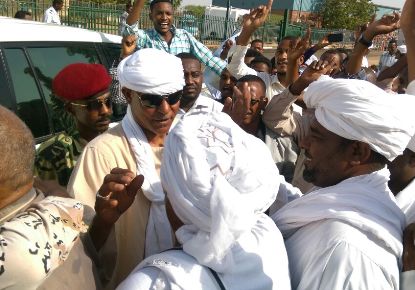Ex-Janjaweed leader seeks to register his forces as political party
June 3, 2015 (KHARTOUM) – The leader of the Darfurian clan of Mahameed, Musa Hilal, said Wednesday he intends to discuss with government officials what he called “four pivotal issues” including the registration of his militia as political party.

.
He left Khartoum in mid-2013 and turned his militiamen against the governor of North Darfur state, Osman Kibir accusing him of feeding tribal conflicts in the state.
The notorious Janjaweed leader then started making statements critical of the ruling National Congress Party (NCP), of which he is a member, and calling for deep reforms.
Also, last year Hilal’s troops seized control of western localities in North Darfur state including Saraf Omra, Kutum, Kebkabiya, Al-Seraif, and El Waha.
The tribal chief went further to announce the establishment of administrations in these localities, naming his forces the Sudanese Revolutionary Awakening Council (SRAC).
On Wednesday, Hilal addressed a meeting of his supporters in the Sudanese capital saying he intends to discuss with the political leadership in Khartoum four issues including registration of SRAC as political party, the security arrangements, social reconciliation and the political reforms.
He also said the discussions would include the need for equal sharing of power and wealth besides the just development.
“We came to Khartoum to participate in the swearing-in ceremony of president Bashir and we will sit with decision makers in the coming days to discuss those issues clearly and we would achieve an agreement that will take us and the Sudan forward,” he said.
The tribal leader denied that he is part of the opposition, stressing he would not rebel against the government.
He said that he went to Darfur to visit his people and discuss their concerns, adding the presidency is fully aware of his activities there.
“We are neither outlaws nor opponents as some people claim”, he noted.
“If we were rebels, we would have held arms against the existing legitimate government and we won’t hold arms against our government”, the tribal leader added.
Hilal further said that differences of opinions don’t constitute a crime and divergence of views is not a shame, expressing confidence that SRAC would reach an agreement with the country’s top leadership.
The Darfur conflict began in 2003 when an ethnic minority rose up against the Arab-dominated government in Khartoum, which then was accused of enlisting the Janjaweed militia group to help crush the rebellion.
In April 2006 the UN Security Council imposed financial and travel ban against Hilal for obstructing peace in Darfur. The then US president George Bush issued an executive order enforcing similar sanctions on them.
In January 2008, Bashir appointed Hilal as a special advisor for the Ministry of Federal Affairs in Sudan.
(ST)
